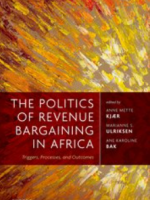Money speaks loud in the politics of Tanzania and Uganda
The future of democracy in Africa will mean more money in politics as richer businesspeople help to finance (especially) the ruling party presidential and parliamentary election campaigns. In this way funders seek to buy influence over government policies that affect them and their business operations - for example in getting tax exemption, favours in land deals or in import licensing.
We argue that campaign financing is likely to provide more bargaining power for donors than tax-paying does for three reasons. Increased electoral competition (absent oppression of the opposition) makes the ruling party more dependent on private campaign funding to run effective campaigns. Moreover, unlike tax payment, campaign funding can be targeted to those politicians—especially the presidential candidate—that are able to influence the allocation of government rents due to their position in the party or in parliamentary committees. Finally, campaign costs are—relative to the government budget—much smaller so that a private donation to a campaign makes a relatively bigger addition (and hence, buys relatively more influence) than an equivalent taxpayment to the government’s general budget.
By many accounts, including from our own field interviews as well as secondary sources, running for Parliament in Uganda has become very costly, while the campaign expenses for president are astronomical compared to Tanzania. This is in part due to the weakness of Uganda´s ruling party and the fragmentation of the ruling coalition, necessitating more resources to oil the patronage machinery, especially during election campaign time. In both countries, the ruling party far outspends the combined opposition, pointing to a hugely skewed campaign finance landscape. This has grave implications for the struggle for democracy, the quality of elections, and the state of good governance among African countries.
Our chapter – “Campaign financing and revenue bargaining in Tanzania and Uganda” - is part of a book on “The Politics of Revenue Bargaining in Africa,” which examines the politics of revenue bargaining in Africa at a time when attention to domestic revenue mobilization has expanded immensely. Measures to increase taxes and other revenues can—but do not always—lead to a process of bargaining, where revenue providers negotiate for some kind of return.
The book offers in-depth analyses of micro-instances of revenue bargaining across five African countries: Mozambique, Senegal, Tanzania, Togo, and Uganda. The case studies all draw on a common theoretical framework combining the fiscal contract theory with the political settlement approach, which enables a systematic exploration into what triggers revenue bargaining, how these processes unfold, and, finally, if and when they result in an agreement—whether that is a fiscal contract or not. From these empirically rich case narratives emerges a story of how power and initial bargaining position influence not only whether bargaining occurs in the first place, but also the processes and their outcomes. Less resourceful taxpayers find it harder to raise their voice, but in some cases even these groups manage to ally with other civil society groups to protest against tax reforms they perceive as unfair. Indirect taxes such as VAT often trigger protests, as do sudden changes in tax practices.
Taxpayers rarely call for improved services in return for paying tax, which would be expected to nurture the foundation for a fiscal social contract. Instead, revenue providers are more likely to negotiate for tax reductions, implying that governments’ efforts to increase revenue are impeded. Indeed, we find many instances of state–society reciprocity when ruling elites try to be responsive to revenue providers’ demands. The Politics of Revenue Bargaining in Africa hence provides insights into the nature and dynamics not only of revenue bargaining but of policymaking in general as well as its implications for state–society reciprocity in Africa.
DIIS Experts


